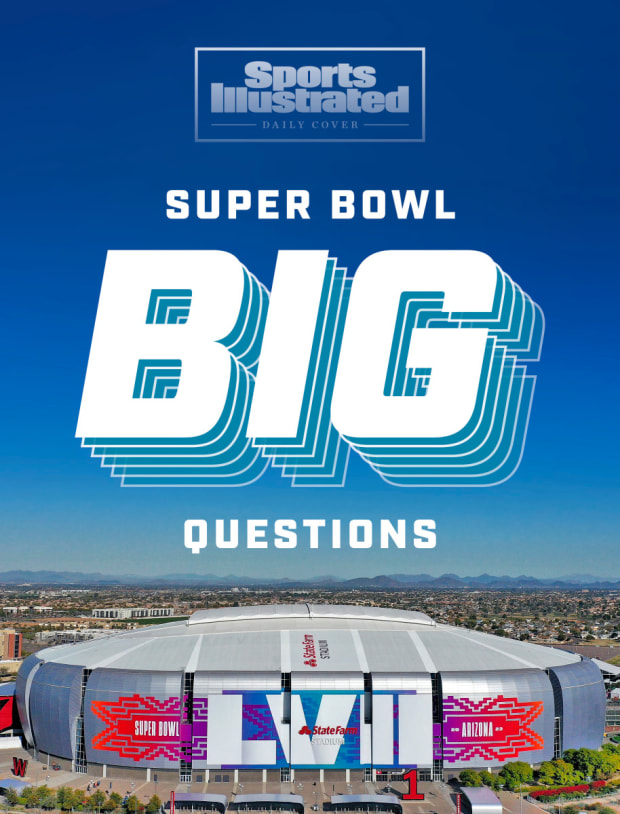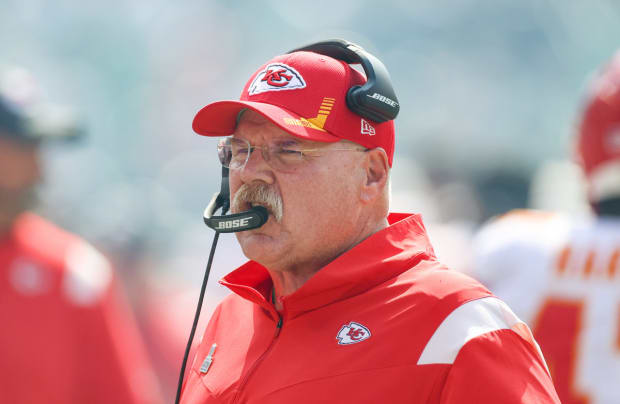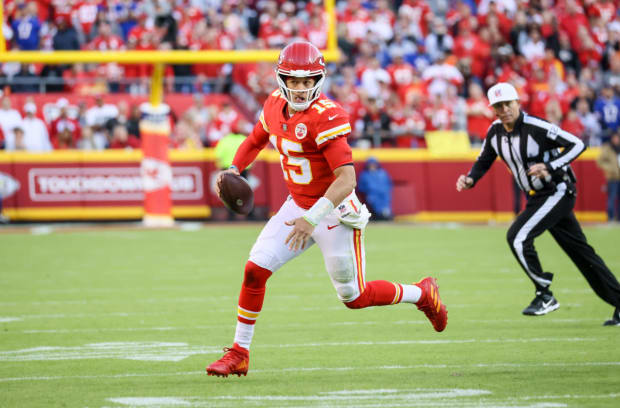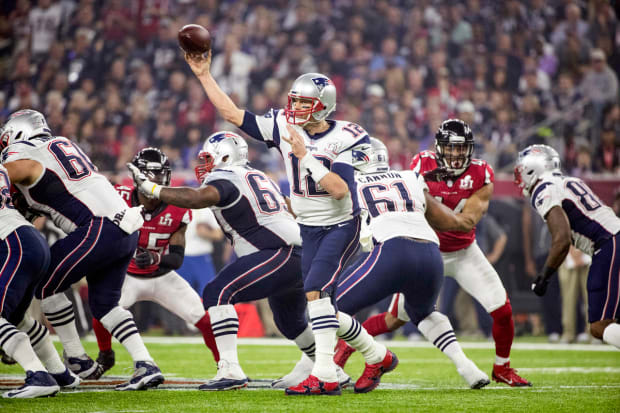The Big Game is finally here. It’s Andy Reid vs. Nick Sirianni. It’s Jalen Hurts vs. Patrick Mahomes. It’s Lane Johnson vs. Chris Jones. Oh, and it’s the Chiefs and Eagles at 6:30 p.m. ET Sunday in Super Bowl LVII at State Farm Stadium in Glendale, Ariz.
This Super Bowl is rife with story lines, so we decided to pose some compelling questions to our MMQB staff. So in honor of Tom Brady retiring and likely not playing in this game again, let’s go!

Christian Petersen/Getty Images
Which player will everyone be talking about after Sunday?
Conor Orr: Boston Scott. The 5'6", 203-pound running back out of Louisiana Tech, known widely as a Giants killer, will be instrumental in nosing the Eagles into the end zone Sunday in lieu of Jalen Hurts, who will want to keep his arm fresh and, thus, out of some rugby scrums in short-yardage situations.
Michael Rosenberg: Mahomes. Let’s face it: We are a star-driven, narrow-minded society prone to reductive conclusions. We are obsessed with quarterbacks, and even though we all know that football is a complex game played by teams with large rosters and coaching staffs, we can’t let go of the idea that wins are a quarterback stat. And the truth is that the Chiefs need more from Mahomes than the Eagles need from Jalen Hurts. If the Chiefs lose, we’ll hear that Mahomes is “only” 1–2 in Super Bowls, as though having the same Super Bowl record as Dan Marino, Aaron Rodgers, Matt Ryan and Warren Moon combined is some kind of career indictment. And if the Chiefs win, we’ll talk about Mahomes as the clear-cut No. 1 player in his sport. (But he is, so I’m cool with that.)
Greg Bishop: I agree with Mike, and, as usual, he covers every point well. I could make an argument for Hurts if the Eagles win. But the trend in his career is for people to doubt even his great accomplishments. Between Mahomes’s ankle, his gutsy play against Cincinnati and three Super Bowl appearances in four years, Mahomes will be much discussed, as always, either way.
Albert Breer: Chris Jones. Over the past four Super Bowls, we’ve seen three defenses stand up and make the biggest plays at the biggest moments—it was the Patriots in LIII, the Buccaneers in LV and the Rams in LVI. And in this game, with teams that I think will be able to score on each other, it’s going to come down to which defense makes game-changing plays at the end and which defense doesn’t. Last year, Vonn Bell’s fingertips just missed Matthew Stafford’s no-look throw, and Aaron Donald sniffed out and outfoxed a double team to close out Joe Burrow and the Bengals. I’d push my chips to the middle of the table on Jones making that sort of difference Sunday.

Which matchup will determine Sunday’s outcome?
Orr: Jones against the Eagles’ offensive line. Mark my words: If the Eagles take care of Jones and keep him from getting in the backfield, they will win by double digits. I am that confident. Jones is not a singular game-wrecker on that defense but is probably the one who could do the most damage to the Eagles.
Rosenberg: Kansas City’s defensive backs covering AJ Brown and DeVonta Smith. The Eagles have beaten teams with the same formula all season: pass to take the lead, run to seal the game. Three of the Chiefs’ top four corners—Trent McDuffie, Jaylen Watson and Josh Williams—are rookies, but McDuffie and Watson, in particular, have both really come on lately. Chiefs defensive coordinator Steve Spagnuolo is a longtime master of finding ways to get pressure with four pass rushers, and if he can do that this time, that should help Kansas City’s linebackers take away the middle of the field. But those corners will still have to make plays against two of the best receivers in the league.
Bishop: If Philadelphia is going to attack Kansas City anywhere with great success, the sources I spoke with believe it’ll try to run the ball. This strategy would limit the Chiefs’ pass rush, take time away from Mahomes and that lethal offense and wear down Kansas City’s defense. It’s also likely that’s exactly what K.C. coaches are expecting. Whether Philly can run the ball on the Chiefs should be revealed early on, like by the end of the first half.
Breer: Jonathan Gannon vs. Travis Kelce. Gannon’s defense has done great against tight ends this year—only three have gone for even 50 yards on the Eagles, and none have gotten to 70 yards through 17 regular-season and two playoff games. On the flip side, Gannon’s scheme has been heavier on zone looks that the heady Kelce and Mahomes typically eat alive. So the adjustment Gannon makes, and how he deploys his linebackers and defensive backs to handle Kelce—maybe starting with mugging him at the line—should go a long way in determining how this one goes, with Kelce such a security blanket for Mahomes on third down and in the red zone.

Simon Bruty/Sports Illustrated
Where does Andy Reid rank among the greatest offensive innovators of all time?
Orr: I think first for me, and here’s why: He ushered in the era and expectation that coaches abandon their system. Reid was a West Coast guy for a long time, and while some of what he does may still be grounded in West Coast principles, he runs Air Raid, sprint option, all kinds of stuff. Sure, it’s cool to come up with your own offense, but abandoning the idea that you need an offense is pretty radical, too [takes massive bong rip].
Rosenberg: Um … not that high? Look, we all know Reid is an exceptional play-caller and offensive designer. You can say he is the best at running a modern offense, and I wouldn’t quibble. But when you list all-time innovators … Sid Gillman, Don Coryell and Bill Walsh all had a much bigger impact on the evolution of the passing game than Reid. I would even argue for assistants Mouse Davis, whose Run ’N’ Shoot offense was revolutionary, and Alex Gibbs, who showed the league how a zone-blocking scheme with smaller, athletic linemen could produce a dominant run game. I think teams are more likely to pass on third-and-2 because of Reid, but that’s a more subtle change than what those other innovators wrought.
Bishop: Depends on how you define revolutionary. Mike isn’t wrong above in that there are other coaches who developed and created and molded really distinct offenses. But that argument also penalizes Reid for not coaching in earlier eras. There’s not a whole lot of truly innovative schemes to concoct out there. If we’re talking about great offensive coach … scored a lot of points … won a lot of games, and all that—I’d definitely put Reid up there. I’d put him over several people on the list above, who were innovative but whose innovations were better utilized by others down the line. Winning still matters, right?
Breer: I think his genius is in the humility it takes to admit the next guy’s doing something pretty cool—to the point where he says, I ought to be doing that myself. Forever, NFL coaches looked down on “college” offenses, pegging them as gimmicky and not adaptable to the pros, which insulated the three or four coaching trees that seemed to produce just about every play-caller for a generation. Reid, more or less, said, “to hell with that.” At the end in Philly, he built an offense that, finally, got the very most out of Michael Vick. Then he hired Nevada’s spread guru, Chris Ault, to build an offense that would work for Alex Smith, who’d been at his best in the spread, both in college and the NFL, which seamlessly flowed into the Air Raid–influenced scheme he put together for Mahomes. Reid’s successor in Philly, Chip Kelly, used to tell me that very few things in football are actually revolutionary—most of it is evolutionary (he’d point out that TCU legend Dutch Meyer was running RPOs in the 1940s in the Southwest Conference). To me, Reid understands, and leverages that cat-and-mouse game better than anyone. And so where Bill Walsh’s short, high-percentage passing game, Don Coryell’s vertical passing game, Paul Brown’s willingness to throw the ball, period, and Mike Shanahan’s zone-run game all changed football and led to a lot of imitation, Reid’s willingness to imitate, to me, is where his legacy as an offensive coach lies.

David E. Klutho/Sports Illustrated
Would you rather have Patrick Mahomes or Jalen Hurts with one last drive to win the Super Bowl?
Orr: I think both of these quarterbacks have exceptional mental fortitude to the point where it would be difficult for me to compare. If I had either one of them on my team, I’d be pretty content with lining up at the 20, with a minute and a half to go, needing a touchdown.
Rosenberg: Mahomes. He has proven himself to be one of the great quarterbacks in history at any time of the game, and he has consistently come through for Kansas City in the final minutes. Hurts might be a savant in the final two minutes, but we wouldn’t know because the Eagles haven’t needed him to do it much. He threw only 60 fourth-quarter passes the entire season. He had two fourth-quarter drives this season—against the Colts and Cardinals. He completed three passes, total, on those two drives. It’s not Hurts’s fault that the Eagles have been so good … well, I guess it is largely his fault because of how well he has played. But we really don’t have much evidence of his ability to make plays in the clutch, and we certainly don’t have enough evidence to pick him over Mahomes.
Bishop: Mahomes. But I’d take either. No reason to quibble there.
Breer: Mahomes. I don’t think this is that hard. We’ve seen it from one guy in a playoff setting over and over. Maybe we will see it from Hurts on Sunday, but we haven’t yet—he’s got two blowout wins and a blowout loss on his postseason résumé—so it’s hard for me to have near the conviction on Hurts that I’d have on Mahomes (which is no affront, by the way, to Hurts).

Al Tielemans /Sports Illustrated
We’ll never see Tom Brady in a Super Bowl again, so what’s your lasting memory of the seven-time world champion playing in the game?
Orr: How sure are we that we’re never going to see Brady in a Super Bowl again? I would say, even though I’ve seen a few of his Super Bowls live, the pandemic year with the Buccaneers. So early in that game there was such a pronounced coolness and certainty about him. It didn’t take long for me to entertain the idea that the Chiefs would possibly get their doors blown off.






